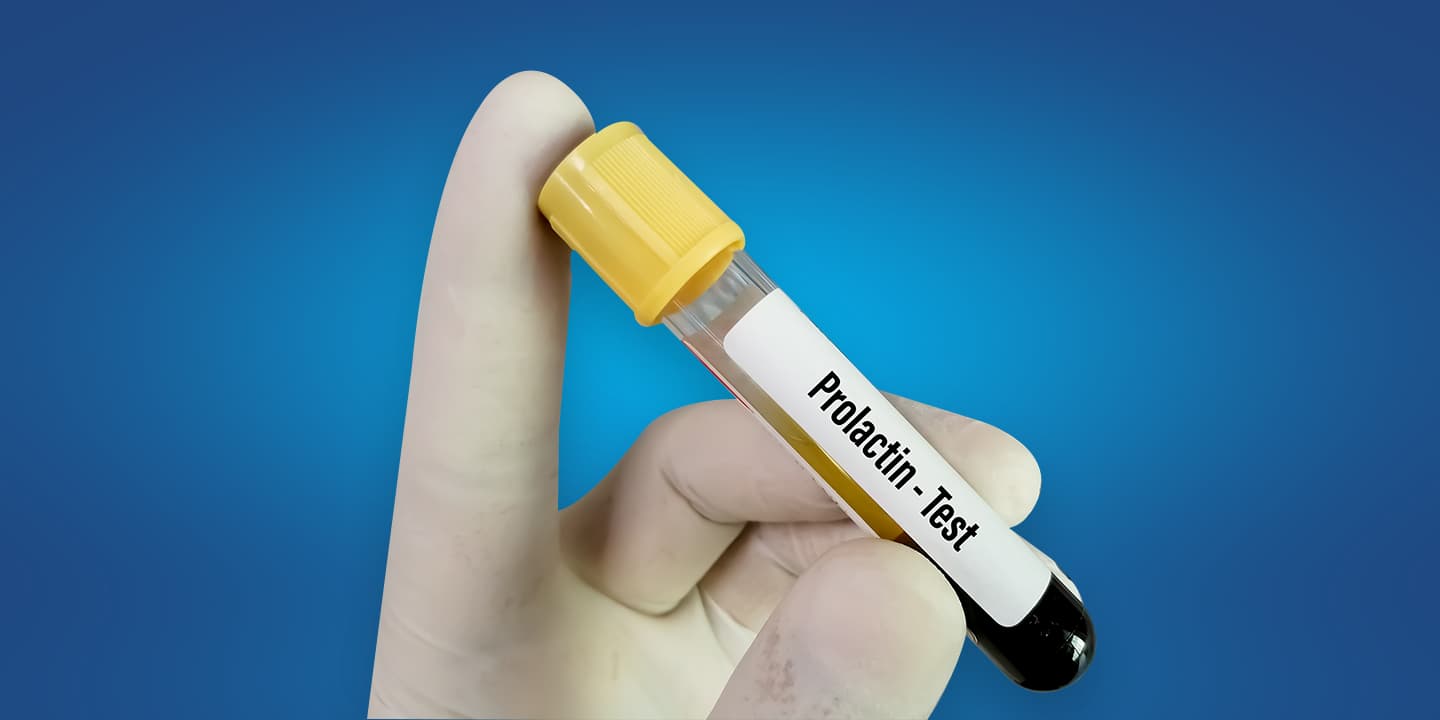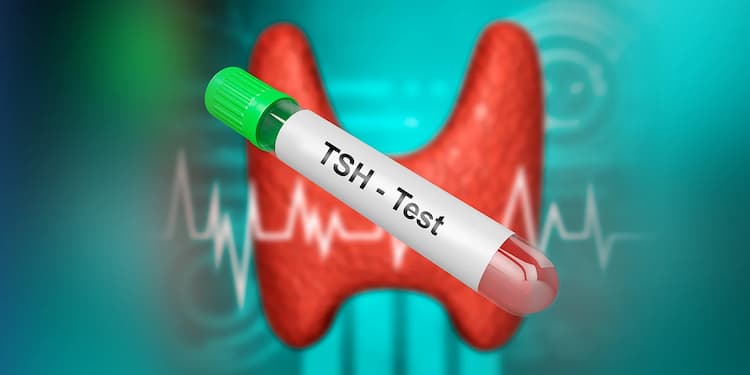Prolactin Test: Price, High vs. Low Levels, Need, & More

Medically Reviewed By
Dr Divya Rohra
Written By Dr. Ragiinii Sharma
on Apr 18, 2022
Last Edit Made By Dr. Ragiinii Sharma
on Mar 18, 2024

Prolactin is a crucial hormone that determines a person’s fertility. The hormone is predominantly formed in both males and females. More importantly, prolactin triggers the body to produce breast milk during and after pregnancy to support breastfeeding.
Elevated or lower prolactin levels in the bloodstream indicate an underlying disorder. Generally, prolactin levels are elevated throughout the pregnancy and during breastfeeding and then gradually return to the normal safe levels.
If you are struggling with infertility or have a potent hormonal balance in the blood, your doctor will prescribe a prolactin test for a thorough check-up to pin point the underlying cause.
This article will explore everything you need to know about the prolactin test, the normal range and the associated cost.
What is the Prolactin Test?
Often abbreviated as the PRL test, it measures the prolactin levels in the blood.
Prolactin is secreted from the pituitary gland. So, abnormal hormone levels, in general, can indicate tumors in the gland.
Excess prolactin is often associated with milk production in men and women, irrespective of pregnancy or breastfeeding. Also, high prolactin levels in non-pregnant females can result in irregular menstrual cycles and eventually lead to infertility.
In men, abnormal prolactin levels lead to complications like erectile dysfunction, lower libido, etc.
If the excess prolactin is due to tumor growth, getting immediate medical help is ideal. Although these kinds of tumors are mostly benign, leaving them without treatment can lead to complications.
Test Details In Brief:
| Also Known As | PRL, PRL Test, Prolactin Blood Test, Serum Prolactin |
| Purpose | Measure Prolactin levels and help diagnose & monitor treatment of pituitary gland disorders |
| Preparation | No Preparations Required |
| Fasting | No Fasting Required |
| Get Reports Within | Same Day |
| Cost | INR 549 |
When do I need a Prolactin Test?
Now that you know about the prolactin hormone function in females and males, it is essential to know when you need to get tested.
Remember that your doctor will most likely prescribe this test for:
- Diagnosis of a tumor in the pituitary gland, also known as prolactinoma
- Diagnose the cause behind irregular menstrual cycles
- Diagnose the reason behind erectile dysfunction or lower libido in men
Besides that, some of the signs and symptoms that suggest a prolactin test include:
- Production of breast milk (without being pregnant or breastfeeding)
- Severe headaches
- Sudden nipple discharge
- Blurred vision
Discuss your symptoms comprehensively with the doctor to get a better approach toward the diagnosis and treatment down the line.
What are the Symptoms of Elevated Prolactin in Men and Women?
Since both men and women produce prolactin, abnormal hormone levels affect both genders. So, it isn’t surprising that the symptoms of excess prolactin levels often vary between men and women.
Let us look into each of them in detail:
Symptoms in females
- Irregular menstrual cycles
- Premature menopause
- Tenderness in the breasts
- Leaking and discharge from the breasts
- Infertility
Symptoms in males
- Sudden breast enlargement (gynecomastia)
- Nipple discharge
- Erectile dysfunction
- Low libido
- Smoother skin with less body and facial hair
- Low testosterone levels

If you are experiencing any of the above symptoms for a long period of time, it is always advisable to consult a doctor for a thorough medical examination and find the cause behind the condition.
How do I prepare for the Prolactin Test?
Knowing what happens when prolactin levels are high is futile if you aren’t aware of how to prepare for the test.
Prolactin levels are measured with a routine blood test. Your doctor will advise staying calm and rested around 30 minutes before the test. Stress and exertion on the body can elevate the prolactin levels and alter the test results.
You will be asked to fast for 8 hours before the test and also avoid stimulating the nipples to avoid the risks of messing up the results.
Also, prolactin levels aren’t stable throughout the day. It generally rises through the night and is at its peak during the morning. So, you will be asked to give your blood sample around 3 hours after you have woken up in the morning.
The blood sample is collected from the vein in your arm, and then sent in for further evaluation.
Procedure Of A PRL Test:
- During the examination, a phlebotomist may tie a band around your arm to make the vein visible.
- They will then clean the site using disinfectant and a sterile syringe to collect the blood.
- The collected blood will then be transferred to a vial, and they will cover the punctured site using a bandage.
The procedure is safe but may cause a little pain or bruise at the punctured site. However, the symptoms will fade away in no time. If the problem persists for longer than usual, take medical assistance.
How do I interpret the Prolactin Test Results?
The normal prolactin range in females and males is less than 17 ng/ml and less than 25 ng/ml, respectively.
So, anything above indicates elevated and abnormal levels of the hormone in the bloodstream. On the other hand, extremely lower levels of prolactin, also known as hyperprolactinemia are very rare. So, the abnormalities of the prolactin levels are marked by its elevated levels in the bloodstream.
Generally, a range between 50–100 ng/ml is considered moderately high, and above 200 ng/ml is considered extremely high.
If the levels are at 50,000 ng/ml, it signifies a sign of a tumor in the pituitary gland that needs immediate intervention.
Besides issues with the pituitary gland, a high level of prolactin in the blood can also indicate possibilities of hypothyroidism, liver disease, or issues with the hypothalamic functions.
Purpose Of Prolactin Test
The test measures the prolactin hormone level in the blood. The purpose of a prolactin test includes:
- Diagnosing Hormonal Disorders: The test analyzes conditions such as hyperprolactinemia due to abnormally high levels of prolactin in blood. This can be caused by various factors, including pituitary tumors (prolactinomas), medications and hypothyroidism, kidney disease, and more.
- Evaluating Reproductive Health: Prolactin regulates menstrual cycle and ovulation in women. Elevated prolactin levels cause irregular or absent menstrual periods, infertility, and other reproductive issues.
- Assessing Pituitary Function: Abnormal prolactin levels indicate problems with the pituitary gland's ability to produce and regulate hormones.
- Monitoring Lactation: Prolactin stimulates milk production (lactation) in breastfeeding women. The test helps to assess lactation and find out the cause of issues.
Normal Range Of Prolactin Level In Men And Women
- Men: Below 20 ng/mL (425 µg/L)
- Nonpregnant Women: Below 25 ng/mL (25 µg/L)
- Pregnant Women: 80 to 400 ng/mL (80 to 400 µg/L)
What Causes Abnormal Prolactin Levels?
There are a variety of reasons that can influence the prolactin level. Here are some common causes of abnormal prolactin levels:
High Prolactin Levels (Hyperprolactinemia):
- Prolactinoma: This is a noncancerous pituitary gland tumor that produces excessive amounts of prolactin. Prolactinomas are the most common cause of hyperprolactinemia.
- Hypothyroidism: An underactive thyroid gland can increase prolactin levels due to the connection between thyroid hormones and prolactin regulation.
- Medications: Certain medications, such as antipsychotics, certain antidepressants, high blood pressure medications (e.g., verapamil), and some medications used to suppress stomach acid (e.g., cimetidine), can cause elevated prolactin levels.
- Chronic Kidney Disease: Kidney dysfunction can affect the clearance of prolactin from the bloodstream, leading to higher levels.
- Stress and Sleep: Severe stress, inadequate sleep, and strenuous exercise can temporarily raise prolactin levels.
- Polycystic Ovary Syndrome (PCOS): Women with PCOS may have slightly higher prolactin levels due to the hormonal imbalances associated with the condition.
- Nipple Stimulation: Frequent nipple stimulation, as can occur with breastfeeding or even constant friction from clothing, can lead to high prolactin levels.
Low Prolactin Levels:
- Pituitary Disorders: Certain pituitary disorders or damage to the pituitary gland can lead to decreased prolactin production.
- Prolactin Deficiency Syndromes: Some genetic conditions can result in insufficient production of prolactin.
- Sheehan Syndrome: This condition can occur after severe blood loss during childbirth, causing damage to the pituitary gland and reducing prolactin production.
- Hypothalamic Dysfunction: Disruptions in the hypothalamus, the part of the brain that regulates the pituitary gland, can affect prolactin production.
- Prolactinoma Treatment: Treatment for prolactinomas, such as surgery or medications, can cause low prolactin levels.
Prolactin Test in Infertility
Prolactin testing helps diagnose fertility, especially during irregular menstrual cycles, ovulatory dysfunction, or other reproductive issues. High prolactin levels can interfere with ovulation and the menstrual cycle and cause infertility problems.
- Ovulatory Dysfunction: High prolactin levels can inhibit the release of luteinizing hormone (LH) and follicle-stimulating hormone (FSH), which are necessary for ovulation. Anovulation (lack of ovulation) or irregular ovulation can result from high prolactin levels and may cause infertility.
- Amenorrhea: Amenorrhea, the absence of menstrual periods, is caused due to high prolactin levels. This condition can increase the risk of infertility due to the lack of ovulation.
- Galactorrhea: Galactorrhea is breast milk production in non-pregnant and non-breastfeeding women. It can be a sign of elevated prolactin levels and might indicate hormonal imbalances that affect fertility.
- Prolactinoma: In some cases, prolactinomas (pituitary tumors that produce excessive prolactin) can cause infertility. Prolactin testing can help identify these tumors.
If you suspect that your fertility might be affected by hormonal imbalances or high prolactin levels, discuss your concerns with a healthcare professional to take a prolactin test.
Tips To Balance Prolactin Levels:
Balancing Prolactin Levels is essential to take control of the condition. Here are some general tips that can help you balance these levels.
- Consult Healthcare Practitioners: Individuals with symptoms associated with elevated prolactin levels need to get themselves tested at the earliest. It helps confirm the root cause behind this elevation and take appropriate action to restore the balance and manage the condition better.
- Address Underlying Condition: Several factors, including thyroid issues, certain medical conditions, or medications, can elevate prolactin levels. Identifying the underlying cause and treating it in time is essential to bring balance, prevent complications, and manage health better.
- Manage Stress: High-stress levels significantly contribute to elevated prolactin levels. Therefore, it is always advisable to practice stress reduction exercises to balance stress and prolactin levels, improving overall quality of life.
- Take Appropriate Sleep: Yes, don’t be surprised. Factor as small as your sleep can significantly impact your health and prolactin levels in general. Taking 8-9 hours of sleep in a day can promise hormonal balance, which, as a result, keeps your prolactin levels in balance.
- Make Exercise A Part Of Your Routine: Being physically active is essential for a healthier you, as it can regulate hormones, including prolactin. So, add at least 30 minutes of moderate exercise to your routine.
- Shed Those Extra Kilos: If you are obese, maintaining adequate body weight is essential to manage hormones like prolactin. However, having a balanced weight is critical, as excessive weight gain or loss can influence their levels.
- Limit Alcohol and Caffeine: Excessive alcohol or caffeine consumption is not good for your health and hormones. It can influence prolactin levels, so limiting their intake is advisable to bring the balance and avoid possible complications.
- Limit Stress On Breasts: Excessive nipple stimulation increases prolactin secretion. Therefore, if it is excessive, try to minimize it.
- Eat Healthy: Clean eating is the key to your good health. Eating a balanced diet rich in whole foods is essential to support hormonal health and balance prolactin levels. Avoid excessive sugary and processed foods that can otherwise influence their levels.
- Regular Checkup: Routine monitoring of your prolactin levels is essential to monitor the fluctuations, detect imbalance early, and act while there is still time. It helps you be proactive and avoid potential complications to a possible extent.
These are general tips that your doctor may suggest depending on your health condition and other factors, and the results can vary for every individual. Therefore, discussing it with your healthcare practitioner is essential to take appropriate care for optimal results. Also, do not miss the S Prolactin Test as suggested by your healthcare provider, as it may help you measure the levels, detect abnormalities, and act in time.
What is the Cost of the Prolactin Test?
The Prolactin test typically costs between Rs. 300-500 in most of the renowned diagnostic laboratories in India people delay the diagnosis because of the high cost of the treatment. However, with Redcliffe Labs, we keep our charges nominal, so everyone has access to quality diagnostics within their budget. With Redcliffe Labs, you can book a Prolactin Blood Test for just Rs 549 with doorstep sample collection convenience. We provide routine to specialized 3600+ tests under one roof at the most competitive rates. You can book the test online and avail yourself of the doorstep sample collection convenience.

PRL Test Cost in Different Cities - Redcliffe Labs
| City Name | Discounted Price |
| Delhi | ₹549 |
| Ahmedabad | ₹549 |
| Mumbai | ₹549 |
| Bangalore | ₹549 |
| Noida | ₹549 |
| Pune | ₹549 |
| Lucknow | ₹549 |
| Hyderabad | ₹549 |
| Chennai | ₹549 |
| Gurgaon | ₹549 |
| Jaipur | ₹549 |
| Faridabad | ₹549 |
| Indore | ₹549 |
| Patna | ₹549 |
Note: We also offer Prolactin Test PAN India. Please call the number 8988988787 to check the availability of services in your area.
Check Your Prolactin Levels With Redcliffe Labs!
We understand the power of accurate diagnosis in safeguarding your health. Therefore, we provide precise testing and accurate reports within a stipulated time frame. In addition, we offer express slots to help your sample get picked within 45 minutes. We offer routine to specialized tests with doorstep sample collection convenience. So, why take any risk for your health? Book your Prolactin Blood Test in time to measure, monitor & manage them better.
Conclusion
Having high prolactin levels in the blood is not a death sentence. Typically, your doctor will advise further testing to find the cause behind the abnormal levels and then administer the required treatment. The test is very simple and doesn’t impose any risks or side effects, so you won’t have to worry about any associated complications.
Frequently Asked Questions:
1. What is a prolactin test?
Being a simple blood test, it measures prolactin levels in the blood. This test may help detect abnormalities and diagnose conditions associated with the pituitary gland.
2. What is the price of a prolactin test?
Prolactin Test Price may vary from city to city and lab to lab for various reasons, but with Redcliffe Labs, you can avail of it at the most competitive rates possible. Our Prolactin Test Cost is just Rs 549.
3. How is a prolactin test done?
It involves simple blood brawn. A phlebotomist may collect the blood sample from a vein and send it to the laboratory for further analysis. The reports will be delivered to you within a stipulated time frame.
4. Why is a prolactin test done?
A prolactin test helps diagnose and monitor conditions related to abnormal prolactin levels. It helps find the cause of irregular menstrual cycles, infertility, breast milk production, and pituitary gland disorders.
5. Is low prolactin dangerous?
Having low prolactin levels is not considered dangerous. However, extremely low levels could potentially indicate an underlying issue with the pituitary gland or other hormonal imbalances. Your doctor may suggest treatment depending on your condition and health requirements.
6. When to take a prolactin blood test?
Your healthcare practitioner may suggest you take a Prolactin Blood Test when you have symptoms linked with abnormal prolactin levels.
7. Does a prolactin blood test require fasting?
Fasting is not required for a prolactin test. It means you can eat or drink normally before the test. However, factors like stress, physical activity, or some medication can influence their levels, so following a doctor’s instructions is advisable.
8. Does a prolactin blood test require fasting?
It primarily measures prolactin levels and is not a definitive pregnancy test. However, prolactin levels can increase during pregnancy but are not used for confirming pregnancy. Your doctor may suggest other tests for that.
9. When to test prolactin levels?
Depending on your symptoms and medical history, your practitioner may suggest a prolactin level test. Getting tested in time is essential to identify the problem early and take charge of your condition.
Leave a comment
3 Comments
Ezike Angel George
Jan 4, 2024 at 7:23 AM.
Hello my prolactin was 27ng/ml then I started taking parlodel 2.5mg then reduced it to 15.2ng/ml then was having a stonger eretion but I can't mataining an erection so I took parlodel to reduce it so If I can maintain an eretion but now I have stop having a stronger eretion after I took parlodel again now my prolactin level is 9ng/ml when I rechecked
Myhealth Team
Jan 4, 2024 at 11:53 AM.
If you're experiencing changes in sexual function after adjusting Parlodel for prolactin, consult your healthcare provider for guidance on medication and discuss any concerns you have.
Priyadharshini
Jul 6, 2023 at 7:40 AM.
Prolactin level is 3.7 is normal
Myhealth Team
Jul 7, 2023 at 7:04 AM.
Hi Priyadharshini, Yes, Prolactin levels below 3.7 ng/ml are considered within normal range. Thankyou
Neeru rana
May 15, 2023 at 1:30 PM.
Is prolactin level 53.3 nhi/ml normal during 1st trimester?
Myhealth Team
May 16, 2023 at 6:37 AM.
Hi Neeru Rana, Thanks for your enquiry. A level of 53.3 ng/mL may be within the normal range for pregnancy, but the interpretation of the result depends on the context of the individual's specific situation and any associated symptoms or medical conditions. It is important to discuss the results with your healthcare provider, who can evaluate the results along with other clinical information and determine whether any further testing or treatment is necessary. Thankyou
![Gluten Allergy Test - Price, Purpose, & Result [2024]](/myhealth/_next/image/?url=https%3A%2F%2Fmyhealth-redcliffelabs.redcliffelabs.com%2Fmedia%2Fblogcard-images%2FNone%2Fe94dfe46-8720-40de-854a-deedae3143d1.webp&w=750&q=75)


